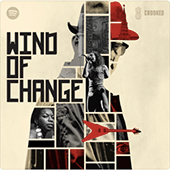Does The Evil Dead hold up in 2020? Werewolf Ambulance investigates

The Ezra Klein Show
Why The Coronavirus Is So Deadly For Black America
Somewhere near the beginning of the pandemic, a meme was going around to the effect of, “y’all needed a white person to tell you coronavirus is killing Black folks at an exponentially higher rate.” And, yes, maybe some folks do. This episode of The Ezra Klein Show is a demonstration of allyship, amplifying the voice of the Black community, illuminating the reasons why Black and brown populations find themselves even more vulnerable at this time. Featured guest David R. Williams, professor of public health and chair of the Department Of Social And Behavioral Sciences at the Harvard T.H. Chan School Of Public Health, lays out the long history of inequities Black and brown communities face in America, and how this inequality adversely affects their health. According to Williams, segregation, income disparity, and micro/macro aggressions correlate with negative changes in health across non-white populations—and COVID-19 has only made the issue more obvious and pressing. Throughout his conversation with Klein, Williams weaves facts, figures, and statistics together with personal anecdotes to dream a healthy future for all. [Morgan McNaught]
The Sporkful
Writer Samantha Irby Is Having Fewer Over-The-Sink Moments
In her work, bestselling author and creator of the blog bitchesgottaeat Samantha Irby manages to find humor in personal tragedy and hardship. As a guest on The Sporkful, a podcast that “obsess[es] about food to learn more about people,” Irby explores with compelling honesty everything from the realities of Crohn’s disease to the socioeconomic implications of what we eat—and shares some pretty fascinating stories about sex and food, too. Entertainingly self-deprecating, Irby nonetheless projects an appreciation for her personal growth that listeners might find aspirational. Sporkful host Dan Pashman is warm and insightful, unafraid to ask the sort of questions that fully engage with Irby’s sex- or health-related stories while never coming across as judgmental. [Jose Nateras]
Werewolf Ambulance
The Evil Dead (1981)
The public perception of 1981’s The Evil Dead has definitely shifted over time, first earning a reputation as a successful independent film, then becoming a cult classic, and now considered an iconic if schlocky B-movie, roughly hewn and dated as hell. Although Werewolf Ambulance hosts Allen and Katie have been friends for the past 10 years, they’re not technically part of the same generation, so fervent Evil Dead fandom, and the “Evil Dead Guys” who exhibited it, looked rather different throughout their respective teenage years. Katie’s mental association is the sort of skater guys who wouldn’t call her back; Allen, the older of the two, thinks of these fanboys more like Pantera devotees. Though she first saw the film at 17, Katie is particularly not fond of it in the current moment, pointing to the infamous tree-assault scene as something that reads more bleak than scary—an opinion at odds with Allen’s, whose sense of nostalgia compels him to rate this a perfect ’80s film. [Jose Nateras]
Wind Of Change
My Friend Michael
It’s well known that the CIA was responsible for the rise of American abstract expressionism, but did the agency also write one of the greatest whistling-centric hair metal ballads of all time? Were German rockers Scorpions in cahoots with the American government to inspire the downfall of the Soviet Union with their 1990 hit “Wind Of Change”? This is the mystery at the center of a new eight-part series from New Yorker journalist Patrick Radden Keefe. In each episode, Keefe delves deep into the paranoia and propaganda of the culture war the United States and the U.S.S.R. raged against each other until the latter’s dissolution in 1991. This is a project that has been on Keefe’s mind since 2011 when he first heard the rumor from a former CIA operative. The fact that this operative will not go on the record about saying any of this, or even admitting he was an operative, underlines just how difficult Keefe’s quest for the truth is going to be. It’s a quest well worth taking, however, as Keefe navigates the byzantine labyrinths of the intelligence community and explores how pop culture defined the Cold War. [Anthony D Herrera]